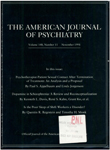The DST in children and adolescents with major depressive disorder
Abstract
The authors analyzed dexamethasone suppression test (DST) results from 13 prospective studies on the use of the DST in children and adolescents with psychiatric disorders. Sensitivity of the DST was significantly higher among the children than among the adolescents with major depressive disorder (69.6% and 47.1%, respectively), and specificity was significantly lower (69.7% and 80.2%). Significantly more adolescents with major depressive disorder than with other psychiatric diagnoses, especially conduct disorder, were nonsuppressors. The authors discuss possible explanations for the high DST sensitivity among the children and point out the potential usefulness of the DST in differentiating major depressive disorder from conduct disorder.
Access content
To read the fulltext, please use one of the options below to sign in or purchase access.- Personal login
- Institutional Login
- Sign in via OpenAthens
- Register for access
-
Please login/register if you wish to pair your device and check access availability.
Not a subscriber?
PsychiatryOnline subscription options offer access to the DSM-5 library, books, journals, CME, and patient resources. This all-in-one virtual library provides psychiatrists and mental health professionals with key resources for diagnosis, treatment, research, and professional development.
Need more help? PsychiatryOnline Customer Service may be reached by emailing [email protected] or by calling 800-368-5777 (in the U.S.) or 703-907-7322 (outside the U.S.).



